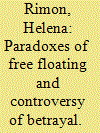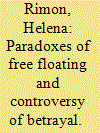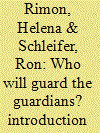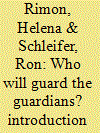|
|
|
Sort Order |
|
|
|
Items / Page
|
|
|
|
|
|
|
| Srl | Item |
| 1 |
ID:
167156


|
|
|
|
|
| Summary/Abstract |
This article compares the image of the Arab in Israeli literature to the image of the enemy in Soviet literature. Focusing mainly on texts that describe the 1948 War of Independence written by Israeli authors of the so-called Palmah generation, it evaluates literary canons and their structures, namely the characters and plots. It finds a rare case of contact without influence whereby the massive presence of translated Russian works in Israeli cultural and literary life left little impact on original Hebrew literature of the time as far as the enemy’s image is concerned.
|
|
|
|
|
|
|
|
|
|
|
|
|
|
|
|
| 2 |
ID:
123054


|
|
|
|
|
| Publication |
2013.
|
| Summary/Abstract |
Throughout the 1900s, intellectuals have been defined as a "privileged minority" (according to Chomsky), or as outsiders, whose "free floating" condition (Mannheim) guarantees their functioning as "custodians of values like reason and justice" (Hofstadter). Julien Benda accused intellectuals of betraying this mission. But, perhaps, betrayal is built into the very nature of their privileged position; perhaps, by pretending to be "free floating," generations of intellectuals have actually been constructing predictable paradigms, using calamity as a new kind of raw material for the old myth of lucrimax (Etkind). The tragic experience of Russian intellectuals provides us with fresh insight for this discussion.
|
|
|
|
|
|
|
|
|
|
|
|
|
|
|
|
| 3 |
ID:
124914


|
|
|
|
|
| Publication |
2013.
|
| Summary/Abstract |
Throughout the 1900s, intellectuals have been defined as a "privileged minority" (according to Chomsky), or as outsiders, whose "free floating" condition (Mannheim) guarantees their functioning as "custodians of values like reason and justice" (Hofstadter). Julien Benda accused intellectuals of betraying this mission. But, perhaps, betrayal is built into the very nature of their privileged position; perhaps, by pretending to be "free floating," generations of intellectuals have actually been constructing predictable paradigms, using calamity as a new kind of raw material for the old myth of lucrimax (Etkind). The tragic experience of Russian intellectuals provides us with fresh insight for this discussion.
|
|
|
|
|
|
|
|
|
|
|
|
|
|
|
|
| 4 |
ID:
124912


|
|
|
|
|
| Publication |
2013.
|
| Summary/Abstract |
The present special issue aims to raise questions about intellectuals, those members of society who are typically expected to engage in fruitful questioning of social mores.
A key contribution of 18th-century Enlightenment thought to modern culture was the special status associated with a university degree. The mode of thinking which corresponds to this development is still prevalent today. A university alumna holding a degree in the humanities-and, historically beginning at a somewhat later date, also one holding a degree in the social sciences-automatically achieves the halo of a gatekeeper in our society. Yet at the same time, in our era, political violence also draws considerable support from influential intellectuals. Intellectuals in the last three centuries have in different ways expressed their support for political violence, even identifying with it ideologically and emotionally. Intellectuals have even provided the perpetrators of violence with a legitimacy of sorts at different junctures, while the perpetrators of violence themselves have in turn cited humanistic values to advance their perverted worldviews and to obtain a grounding for them.
|
|
|
|
|
|
|
|
|
|
|
|
|
|
|
|
| 5 |
ID:
123052


|
|
|
|
|
| Publication |
2013.
|
| Summary/Abstract |
The present special issue aims to raise questions about intellectuals, those members of society who are typically expected to engage in fruitful questioning of social mores.
A key contribution of 18th-century Enlightenment thought to modern culture was the special status associated with a university degree. The mode of thinking which corresponds to this development is still prevalent today. A university alumna holding a degree in the humanities-and, historically beginning at a somewhat later date, also one holding a degree in the social sciences-automatically achieves the halo of a gatekeeper in our society. Yet at the same time, in our era, political violence also draws considerable support from influential intellectuals. Intellectuals in the last three centuries have in different ways expressed their support for political violence, even identifying with it ideologically and emotionally. Intellectuals have even provided the perpetrators of violence with a legitimacy of sorts at different junctures, while the perpetrators of violence themselves have in turn cited humanistic values to advance their perverted worldviews and to obtain a grounding for them.
|
|
|
|
|
|
|
|
|
|
|
|
|
|
|
|
|
|
|
|
|